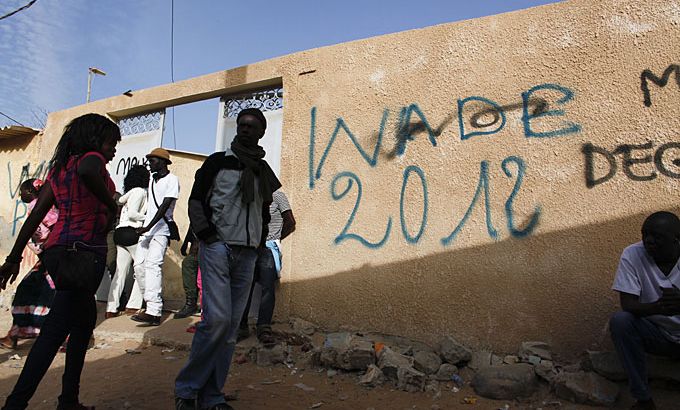
Is Senegal’s democracy at stake?
As President Wade fights to stay in power, we ask if the country can retain its reputation for peace and stability.
Controversy looms over elections in Senegal.
|
“Changing the constitution to accommodate his own personal circumstance and also to support all those who’ve been galvanising around and supporting him over the last 12 years is wrong. You cannot on one hand say you support the principles of democracy but then you’re prepared to change to accommodate your own personal gains.” – Ayo Johnson, a journalist and director of news website Viewpoint Africa |
Voters headed to the polls on Sunday in what has been the most tumultuous election the country has ever seen.
Abdoulaye Wade, the 85-year-old incumbent president, is running for a third term – sparking violent protests that could endanger the country’s record as the most stable in Africa.
Opposition groups say the leadership bid is unconstitutional, but Wade is not backing down.
Back in January, the incumbent justified his position in running for a third term, saying: “Everybody knows the law is not retroactive. I wrote the constitution. Alone. Nobody knows it better than me. I can even legally stand again in 2019.”
He added: “I still feel physically and intellectually able to serve my people. I cannot stop in midstream. I need three years to complete some major projects that will turn Senegal into an emerging country.”
Amadou Sall, Wade’s official spokesman, told Al Jazeera that the incumbent’s candidacy was allowed under the constitution.
“President Wade is elected by the constitution of 1966 and after he has been elected they changed the constitution. And in the year 2001 they had a new constitution and in terms of this constitution, President Wade was elected for the first time in 2007.
“It’s not right if you say that he’s not popular. President Wade is popular and you will see. This is a democracy. Even in London, now, right now, and every day in the United States, people are protesting.”
There are 14 candidates, including two women, who contested Sunday’s election. Four of them are major contenders threatening to unseat Wade.
Ousmane Tanor Jeng, the Socialist Party candidate, was a campaign manager to Abdou Diouf, the former president. Jeng ran against Wade in 2007, winning over 13 per cent of the vote.
Moustapha Niass has run for the presidency twice before. He once served as Wade’s prime minister but the pair had a falling out. He gained six per cent of the vote in the last election.
|
“Wade’s hidden agenda was to create a monarchy out of a very age-old democratic system in Senegal. He himself said he had reneged on his commitment not to run for another term. This raises suspicion that he wants to run in order to put in place somebody who can cover his back, namely his son.” – Adama Gaye, a veteran Senegalese journalist |
Macky Sall is running for president for the first time. Formerly a close ally of Wade, he also served as his prime minister between 2004 and 2007, before setting up his own party in 2008.
And finally, the charismatic Idrissa Seck is a former prime minister and mayor of Senegal’s second city, Thies. In the 2007 election, he finished second behind Wade with around 15 per cent of the vote.
Thijs Berman, the head of a 90-strong EU observer mission in Senegal, has expressed his concerns over the elections:
“Senegal is at a crossroads and the potential for destabilisation is huge. These elections are crucial for the future of the country. There are political tensions but these tensions keep democracy alive.”
So, what are the challenges ahead as Senegal’s president fights to hang on to power?
Joining presenter Shiulie Ghosh on Inside Story are: Adama Gaye, a veteran Senegalese journalist; Ayo Johnson, a journalist and director of news website Viewpoint Africa; and Issaka Souare, a senior researcher and analyst on West Africa.
|
“The opposition is weak because the big guns have personal problems. So you cannot actually blame everything on Wade, they have their own problems. Even if Wade were to go out of the picture today, you will not see a calm and tranquil campaign because they would fight it out among themselves.” Issaka Souare, a senior researcher and analyst on West Africa |
| Abdoulaye Wade, 85, has ruled Senegal since 2000. He has long championed a United States of Africa. After his victory, Senegal was hailed as a model for democracy on the continent. He quickly earned a reputation for being a decisive leader who developed the country’s infrastructure. But more than a decade on, his presidency has been marred by allegations of fraud, nepotism and limiting the freedom of the press. His attempt to seek a third term in office has angered the Senegalese opposition. But Wade says that he needs three more years to complete his projects, fuelling speculation that he is lining up his son, Karim, as his successor. |